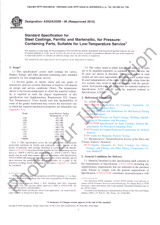Wir benötigen Ihre Einwilligung zur Verwendung der einzelnen Daten, damit Sie unter anderem Informationen zu Ihren Interessen einsehen können. Klicken Sie auf "OK", um Ihre Zustimmung zu erteilen.
ASTM D4740-20
Standard Test Method for Cleanliness and Compatibility of Residual Fuels by Spot Test
Name übersetzen
NORM herausgegeben am 1.9.2020
Informationen über die Norm:
Bezeichnung normen: ASTM D4740-20
Anmerkung: UNGÜLTIG
Ausgabedatum normen: 1.9.2020
SKU: NS-1005066
Zahl der Seiten: 7
Gewicht ca.: 21 g (0.05 Pfund)
Land: Amerikanische technische Norm
Kategorie: Technische Normen ASTM
Kategorie - ähnliche Normen:
Die Annotation des Normtextes ASTM D4740-20 :
Keywords:
cleanliness, compatibility, residual fuel, spot test,, ICS Number Code 75.160.20 (Liquid fuels)
Ergänzende Informationen
| Significance and Use | ||||||
|
5.1 The four procedures in this test method are used alone or in combination to identify fuels or blends that could result in excessive centrifuge loading, strainer plugging, tank sludge formation, or similar operating problems. 5.2 A spot rating of Number 3 or higher on a finished fuel oil by the cleanliness procedure indicates that the fuel contains excessive suspended solids and is likely to cause operating problems. 5.3 Although a fuel may test clean when subjected to the cleanliness procedures (manual and automated), suspended solids can precipitate when the fuel is mixed with a blend stock. Evidence of such incompatibility is indicated by a spot rating of Number 3 or higher in the compatibility procedures (manual and automated). |
||||||
| 1. Scope | ||||||
|
1.1 This test method covers separate procedures for determining the cleanliness of residual fuel oil and the compatibility of a residual fuel oil with a blend stock. It is applicable to residual fuel oils with viscosities up to 50 cSt (1 cSt = 1 mm2s) at 100 °C. This test method describes two protocols: one manual and one automated. Note 1: This test method has not been evaluated for heavy
distillate having the propensity to leave a wax sediment on the
filter paper and contain no residual asphaltene.
1.2 The values stated in SI units are to be regarded as standard. No other units of measurement are included in this standard. 1.3 This standard does not purport to address all of the safety concerns, if any, associated with its use. It is the responsibility of the user of this standard to establish appropriate safety, health, and environmental practices and determine the applicability of regulatory limitations prior to use. 1.4 This international standard was developed in accordance with internationally recognized principles on standardization established in the Decision on Principles for the Development of International Standards, Guides and Recommendations issued by the World Trade Organization Technical Barriers to Trade (TBT) Committee. |
||||||
| 2. Referenced Documents | ||||||
|
Empfehlungen:
Aktualisierung der technischen Normen
Wollen Sie sich sicher sein, dass Sie nur die gültigen technischen Normen verwenden?
Wir bieten Ihnen eine Lösung, die Ihnen eine Monatsübersicht über die Aktualität der von Ihnen angewandten Normen sicher stellt.
Brauchen Sie mehr Informationen? Sehen Sie sich diese Seite an.




 Cookies
Cookies
